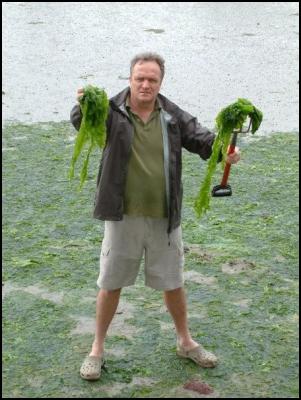An Environmental Issue We Can Fix – Sea Lettuce
Let’s Fix an Environmental Issue We Can Fix – Sea Lettuce

Click to enlarge
24/9/07
IMMEDIATE RELEASE:
Let’s Fix an Environmental Issue We Can Fix – Sea Lettuce
‘Let’s do something about a nagging environmental issue that we can fix – sea lettuce,’ says regional council candidate Grant Dyson.
He believes the regional council should show strong environmental leadership on a problem that affects so many locals almost across all ages – and spear-head a cleanup.
‘The regional council is fond of saying that we have to educate people to the fact that it is a naturally occurring growth, not caused by pollution.
I believe we are at the point where there has been too many reports, fact sheets, monitoring and joint council agreements - that all combine into a perception of an issue “bogged down by bureaucracy.”’
Frankly, I don’t think the public cares at all about the fact that, because sea lettuce blooms are a ‘natural event,’ and there is no legal obligation on any council to clean it up unless they are creating a health hazard. ’
Grant Dyson believes the public have every reason to be confused when the regional council plays a strong role in battling a variety of aquatic pest plants, from salvinia and and alligator weed to Canadian pondweed. It’s hardly surprising their perception is that EBOP should tackle sea lettuce that may not be threatening the ecology of the harbour, but is a huge summer nuisance to beachgoers.
By taking a lead on sea lettuce clean-up the council would gain some enormous public relations benefits. Much of the excellent work by EBOP is either invisible or behind the scenes. But sea lettuce clean-up would show the council in an active role on a key issue of widespread concern, Grant says. He believes the council would receive some real support from the public for other environmental initiatives.
‘Where does the funding come from? I’m not suggesting for a moment a ‘targeted rate’ on Tauranga residents to pay for the clean-up. This is a council that is well off compared with many others through its 55% state in the Port of Tauranga. And the council recently showed the ability to produce an additional $ 200 million funding for roading and other infrastructure, from an innovative bond issue. Surely they find a relatively tiny sum (even $50,000) to assist with regular manual and mechanised cleanups. A lead taken by EBOP would encourage other councils such as Tauranga City Council to up their contributions.
There are many environmental problems - such as the Bay of Plenty’s polluted lakes - that are complex and require a highly scientific, cash-intensive long term solutions. Sea lettuce isn’t one of those issues – it has a financial solution of sorts.’
ENDS


 Gordon Campbell: On Why The Regulatory Standards Bill Should Be Dumped
Gordon Campbell: On Why The Regulatory Standards Bill Should Be Dumped PSA: Sunday Rally To Protest Outrageous Suspension Of 38 Disability Workers
PSA: Sunday Rally To Protest Outrageous Suspension Of 38 Disability Workers NZDF: 1st NZSAS Regiment Marks 70th Anniversary
NZDF: 1st NZSAS Regiment Marks 70th Anniversary Choose Clean Water: Changes To Fish & Game Continue Coalition’s Handover Of Power To Polluters
Choose Clean Water: Changes To Fish & Game Continue Coalition’s Handover Of Power To Polluters Inland Revenue Department: Tax Assessment Period A Prime Time For Scams, Expert Warns
Inland Revenue Department: Tax Assessment Period A Prime Time For Scams, Expert Warns Students Against Dangerous Driving: SADD And AA Celebrate 40 Years Of Tackling Youth Harm On NZ Roads
Students Against Dangerous Driving: SADD And AA Celebrate 40 Years Of Tackling Youth Harm On NZ Roads NZ Labour Party: Timid Tariff Response Fails New Zealanders
NZ Labour Party: Timid Tariff Response Fails New Zealanders


